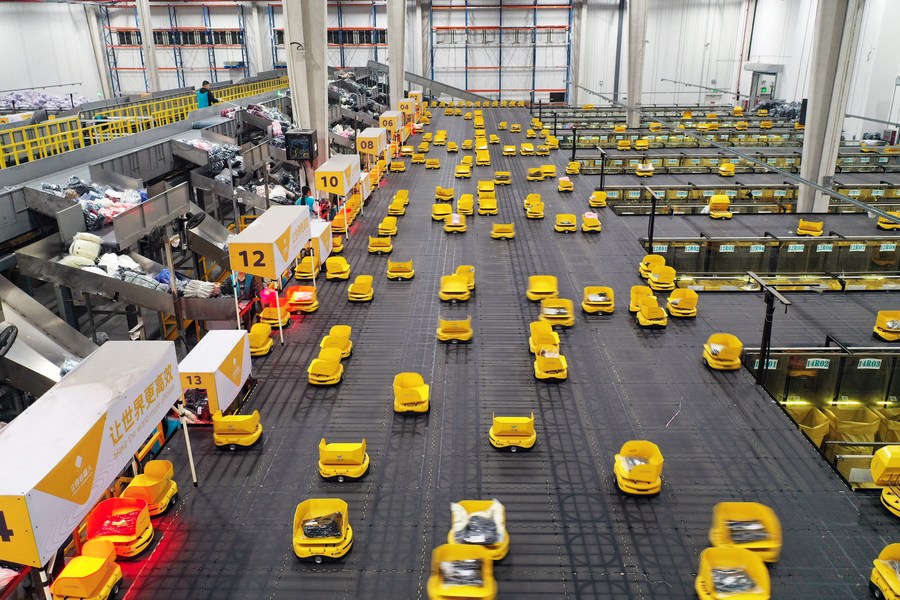
China is ramping up efforts to green its booming express delivery sector, as a newly amended regulation took effect during the bustling mid-year online shopping festival.
The revised regulation concerning the courier sector came into force on June 1, and for the first time introduced a dedicated chapter on packaging. It stipulates that packaging should minimize resource use, avoid excessive wrapping and prevent environmental pollution.
Experts hailed the move as a milestone in the industry's push for sustainable and high-quality development.
ALSO READ: China continues push for greener packaging
China, the world's largest express delivery market, handled over 175 billion parcels in 2024, a 21.5 percent increase from the previous year.
This vibrant growth has led to a surge in packaging waste, making sustainable practices a critical priority, said Ding Hongtao, director of legal affair department at the China Express Association.
The green initiative has already been felt at the manufacturing level. In Pinghu, East China's Zhejiang province, a local packaging company now uses 100 percent recycled cardboard to produce corrugated paper. In its factory, waste boxes are shredded, filtered, refined and pressed into new paperboard.

"For every tonne of corrugated paper, we use about 1.1 tonnes of recycled boxes," said Hu Zhonghua, general manager of Jingxing Packaging Materials Co, Ltd "Even the leftover scraps from box production are cycled back into the paper mill, forming a closed-loop system."
Elsewhere, similar innovations are driving progress. In East China's Anhui province, Anhui Huayi Packaging Co, Ltd has industrialized fully biodegradable adhesive tape after five years of research, and now produces up to 600 million square meters annually. In Hangzhou, Zhejiang, a logistics center of supply chain technology company Shunxinhui has replaced single-use plastic wrap with reusable strapping, thereby avoiding the use of 300 tonnes of plastics on average each year.
ALSO READ: Midyear shopping festival shows robust purchasing power in China
"China is forming a green supply chain for express packaging," said Liu Jianguo, professor at Tsinghua University in Beijing. Data showed that 248 types of packaging products from more than 100 companies have now been certified as green products in the country.
In addition to greener materials, couriers have begun to use packaging more efficiently.

At JD Logistics' industrial park in Hangzhou, home appliances and furniture are now shipped in their original manufacturer packaging, bypassing the need for secondary wrapping.
"By strengthening coordination with suppliers, the share of direct shipments to customers without repackaging has risen from about 5 percent a few years ago to 25 percent last year. And we expect the ratio to hit 40 percent this year," said Gao Jiaqi, head of the industrial park. In 2024 alone, JD Logistics eliminated over 1 billion pieces of secondary packaging.
READ MORE: China's logistics industry prosperity index reaches 51.1% in April
Green practices are also gaining traction among consumers. At a mail service station at Zhejiang University, students and faculty members routinely deposit used boxes into designated recycling bins after collecting their packages.
These boxes are sorted and reused for outbound shipments. Currently, 90 percent of boxes used at the station are recycled, significantly reducing the carbon footprint.

Moreover, a digital screen at the station displays real-time data, converting environmental actions like recycling and walking into carbon credits -- thus fostering a green digital ecosystem through incentives. Following the launch of the system, green awareness among customers has continuously increased, said Chang Xuelian, a staff member of the company managing the system.
READ MORE: Expanded free shipping to up global reach
Thanks to concerted efforts, green packaging governance in the express delivery sector has been expanded to the entire chain -- from production to consumption and recycling.
Moving forward, the State Post Bureau pledged to speed up the implementation of packaging standards and supportive policies, while fostering innovation in products, technologies and business models, in a bid to expedite the green transition of China's fast-growing delivery industry.


